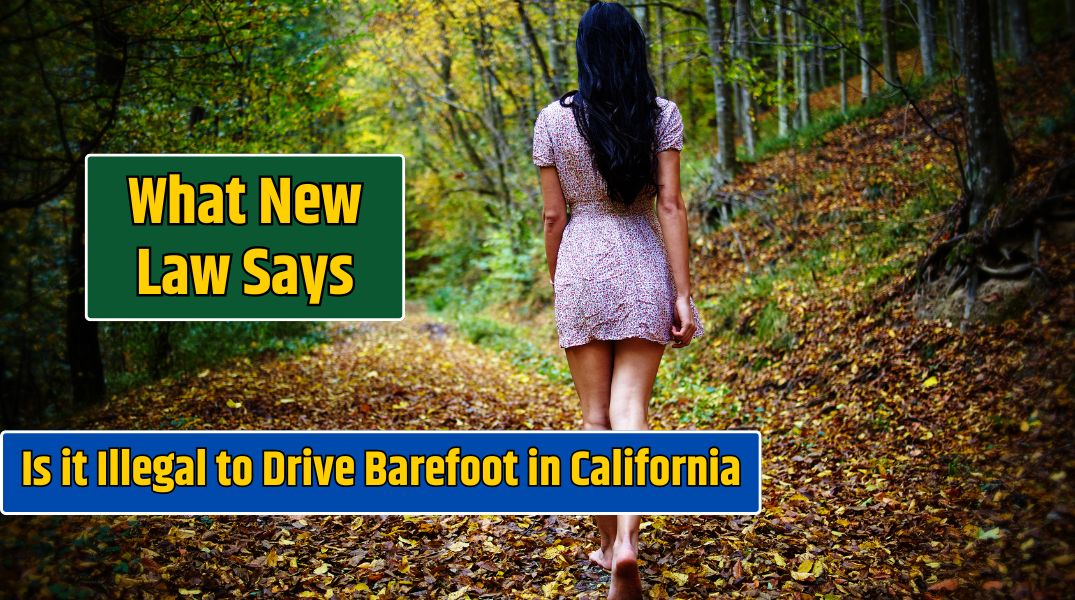Is it Illegal to Drive Barefoot in California: In California, it is legal to drive barefoot. This common misconception has led many to believe that driving without shoes is against the law, but there are no federal or state regulations that prohibit this practice. Understanding the legal context and potential implications of driving barefoot can help clarify this topic.
Legal Status of Driving Barefoot
California law does not specifically address the issue of driving without shoes. The California Vehicle Code does not contain any provisions that explicitly forbid driving barefoot. Therefore, law enforcement officers cannot issue citations solely for the act of driving without footwear. This legality applies not only in California but across all 50 states, where no state has laws explicitly banning barefoot driving.
Safety Considerations
While it is legal to drive barefoot, there are several safety concerns that drivers should consider:
- Reduced Control: Driving barefoot may lead to decreased control over the vehicle. Shoes provide a stable surface that helps maintain consistent pressure on the pedals. Bare feet can slip, especially if they are wet or sweaty, which can hinder a driver’s ability to operate the vehicle safely.
- Injury Risks: Without shoes, feet are more vulnerable to injuries from sharp objects or debris inside the car. In the event of an accident, bare feet could sustain serious injuries from shattered glass or other hazardous materials.
- Burns and Fires: In case of a fire, shoes can offer protection against burns. The materials used in car interiors can become very hot or even melt during a fire, posing a risk to bare skin.
- Legal Implications in Accidents: If a driver is involved in an accident while barefoot, and it is determined that their lack of footwear contributed to the incident, they could potentially be found partially at fault. This determination could affect insurance claims and legal proceedings following the accident.
- Long-Term Foot Health: Regularly driving barefoot may lead to discomfort or strain in the feet due to the hard surfaces of the pedals.
Common Misconceptions
Many people mistakenly believe that driving barefoot is illegal due to widespread myths. However, it is important to clarify that this is not true; driving barefoot is permissible in all states and territories within the U.S., including California.
In summary, while it is legal to drive barefoot in California, drivers should weigh the potential risks associated with this choice. Wearing shoes while driving can enhance control over the vehicle and provide necessary protection for the feet.
Ultimately, while there are no legal restrictions against driving without footwear, prioritizing safety should always be a driver’s primary concern.
Source:
- https://fieldinglawfirm.com/is-it-legal-to-drive-barefoot-in-california/
- https://accidentnetwork.com/can-you-get-pulled-over-for-driving-barefoot-in-california/
- https://www.attorneyhanson.com/is-it-illegal-to-drive-barefoot-in-california/
FAQ
Is it illegal to drive barefoot in California?
No, it is not illegal to drive barefoot in California. However, safety concerns may arise if driving barefoot impairs your control of the vehicle.
Can I get fined for driving barefoot in California?
No specific fines or penalties exist for driving barefoot in California. However, if driving barefoot leads to reckless or unsafe driving, you could be cited for other violations.
Are there safety risks to driving barefoot?
Driving barefoot may reduce your grip on pedals, potentially causing safety issues. It is recommended to wear proper footwear to maintain optimal control of the vehicle.
Does insurance cover accidents when driving barefoot?
Generally, insurance policies do not have exclusions for barefoot driving. However, if the lack of proper footwear is proven to be the cause of an accident, it could potentially affect claims.











